|
|
|
Sort Order |
|
|
|
Items / Page
|
|
|
|
|
|
|
| Srl | Item |
| 1 |
ID:
112438
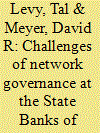

|
|
|
|
|
| Publication |
2012.
|
| Summary/Abstract |
The large state banks of China-the Bank of China, China Construction Bank, and Industrial and Commercial Bank of China-dominate China's financial sector. Reform of these banks has been a major policy effort of China's government because their financial weaknesses exert a drag on the economy. This reform has led to significant improvements in the large state banks. Nevertheless, they face three recurring problems: limited access to expert knowledge about international finance, non-performing loans, and corruption. These problems are rooted in the network governance of the banks. The Chinese government needs to continue transforming this governance to make the large state banks globally competitive.
|
|
|
|
|
|
|
|
|
|
|
|
|
|
|
|
| 2 |
ID:
111433


|
|
|
|
|
| Publication |
2012.
|
| Summary/Abstract |
While a growing amount of literature has recently emerged describing network governance, less attention has been paid to evaluating the actual performance of networks. Our paper looks at the challenges facing network governance for natural resources (primarily logging and forestry) and energy (primarily renewable energy and energy efficiency) in Asia. The paper investigates what network governance is, and what types of challenges networks have to tackle. It then develops a qualitative analytical framework to evaluate the effectiveness of networks consisting of five criteria: (1) clarity of roles and objectives among members, (2) having strong, independent, continual sources of funding, (3) institutional formality (having a permanent secretariat, budget, full time staff, etc.), (4) efficacy (ability to accomplish its mission and goals at the least possible cost); and (5) level of interdependency among members. Finally, we apply this framework to four case studies: the Association of Southeast Asian Nations (ASEAN) Centre for Energy, Renewable Energy and Energy Efficiency Partnership (REEEP), ASEAN Regional Knowledge Network on Forests and Climate Change (FCC), and ASEAN Regional Knowledge Network on Forest Law Enforcement and Governance (FLEG). These cases illustrate effective (or ineffective) environmental and energy networks and the factors that are associated with network governance.
|
|
|
|
|
|
|
|
|
|
|
|
|
|
|
|
| 3 |
ID:
104348
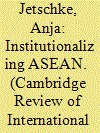

|
|
|
|
|
| Publication |
2011.
|
| Summary/Abstract |
This article provides a new piece for two of the puzzles of institutionalized cooperation in Association of Southeast Asian Nations (ASEAN). First, with regard to the organization's four decades of existence, there has always been a marked gap between ASEAN's rhetorical goals of cooperation and its actual achievements. What explains these systematic failures of implementation? Second, from the outset, ASEAN was criticized for its light institutionalization, which failed to deliver the substantial cooperation goals. Despite selected institutional reforms, ASEAN's autonomy has not increased remarkably and it has not made any major institutional innovations. Why does ASEAN design institutions it does not use? Why does this transformation gap occur? The author suggests a sociological institutional explanation and argues that major impulses for cooperation have come from outside Southeast Asia, most importantly from Europe. By mimicking the European integration process, ASEAN member states have effectively created an isomorphic organization. The Association's institutional development reflects a concern for international legitimacy and less an objective functional demand arising from the specific interactions of member states. This copying process has led to network governance within the organization.
|
|
|
|
|
|
|
|
|
|
|
|
|
|
|
|
| 4 |
ID:
185483
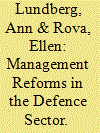

|
|
|
|
|
| Summary/Abstract |
The Swedish defence sector has for the last 30 years been subject to expenditure reductions and changed policy as well as management reforms inspired by the ideas of New Public Management (NPM). The purpose of this article is to provide insights into the major management reforms in the defence sector. We describe and discuss the reforms and the implications for the defence sector in the context of expenditure reductions and changed defence policy. We conclude that the earlier management reforms served as instruments to reduce defence expenditure and that the reforms have affected how agencies and the Government interact and how politicians are able to influence the sector. Furthermore, there are indications that these reforms have contributed to the management challenges we can observe in the defence sector today. These challenges correspond to important features of an efficient network. This implies that there might be a need of a different perspective to improve public management of the defence sector.
|
|
|
|
|
|
|
|
|
|
|
|
|
|
|
|
| 5 |
ID:
171504
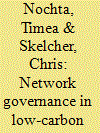

|
|
|
|
|
| Summary/Abstract |
This article evaluates the opportunities and limitations of network governance to support low-carbon energy transitions in European cities. Network visualization and statistical measures of network structure are combined with qualitative case study data to provide a comparative analysis of energy transition networks in Birmingham, Budapest and Frankfurt. Data reveal that existing networks differ in extent, integration and distribution of authority. Contextual characteristics help explain these differences, highlighting the importance of path dependencies and disjunctions in each city. These findings represent important considerations for the Transition Management model which aims specifically at governing sustainability transitions via network governance. Responding to a gap in the literature we demonstrate that Transition Management must be considered as an intervention into locationally specific settings and existing networks. The design of network structures and processes, as well as role of any ‘transition manager’, must reflect contextual factors and existing network considerations. Failure to account for contextual differences limits the model’s capacity to contribute to sustainable energy transitions in different cities.
|
|
|
|
|
|
|
|
|
|
|
|
|
|
|
|
| 6 |
ID:
114220


|
|
|
|
|
| Publication |
2012.
|
| Summary/Abstract |
Networks are often heralded as a promising strategy of global governance. This article examines the challenges encountered in managing one relatively successful network-the Global Outbreak Alert and Response Network (GOARN). Over the past decade, this international network of public and private institutions has played a major role in organizing the global response to infectious disease outbreaks around the world. Despite its successes, GOARN confronts difficult challenges in balancing performance objectives with the goals of maintaining and developing the network. The imperative to integrate closely into World Health Organization (WHO) operations makes it difficult for GOARN to balance its obligations to the WHO with the need to maintain and cultivate its role as an independent network.
|
|
|
|
|
|
|
|
|
|
|
|
|
|
|
|
| 7 |
ID:
171397
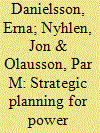

|
|
|
|
|
| Summary/Abstract |
Electricity is critical to almost all other critical infrastructure. Disturbance in the power supply would likely have devastating effects on all areas in society. Assurance of electricity to vital societal functions requires policies to manage power shortages. Such policies exist in only a handful of countries. This study focuses on one of those countries. In Sweden, the policy for power shortages, Styrel, includes all levels of society, all responsible institutions, and expert organisations. The policy is governed from the top down. We are primarily interested in how Styrel affects municipalities in their planning processes and supports decision making at the local level. The study is an interview study with key informants at the municipal level. The results show that the policy is supportive under certain conditions, depending on how the actors carried out previous processes. Lack of knowledge and support, and time pressure, characterise the process, although participants also have a sufficiently positive attitude to allow a more relaxed method of handling the process. The study provides insights on challenges that municipalities must manage in their work with policies for critical infrastructure protection.
|
|
|
|
|
|
|
|
|
|
|
|
|
|
|
|
|
|
|
|
|